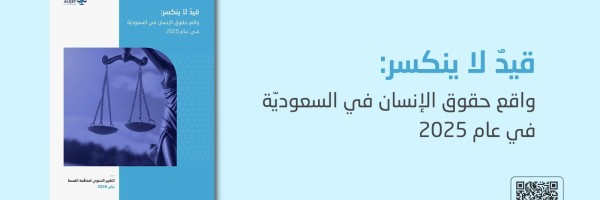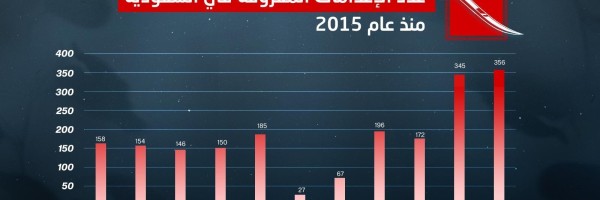Update 13 May 2019: We have news at last of another of the five forcibly disappeared in Saudi Arabia- Yemeni journalist and writer Marwan al-Muraisy. He has contacted his family nearly a year after his enforced disappearance. Yet three more still remain unaccounted for.
On 21 January 2019, ALQST published a statement about five individuals who had been forcibly disappeared in Saudi Arabia, and about whose fate nothing was known. One of them was the Syrian pilgrim Khaled Abdulaziz. ALQST has recently learned that Khaled is in al-Ha’ir political prison in Riyadh and that one of his relatives has been able to see him. Apart from this one visit, however, he is still being denied visits and phone calls.
The Saudi authorities often conceal people’s whereabouts when they are arrested, especially for the first few days of their detention. How long this enforced disappearance lasts depends on whether or not the family and relatives inquire about the victim and demand to know their fate, and also whether the victim’s name is mentioned in the media or raised by NGOs and UN bodies. Detainees tend to remain disappeared for longer if no one asks about them.
ALQST knows of several enforced disappearances that it has not been able to take action on for lack of adequate information, but there are five cases it has been able to document and has recently publicised. They are: Syrian pilgrim Khaled Mohammed Abdulaziz, preacher Sulaiman al-Dowaish, journalists Marwan al-Muraisy and Turki al-Jasser, and humanitarian worker Abdulrahman al-Sadhan.
ALQST recently learned that Khaled Abdulaziz is in al-Ha’ir political prison and is being denied any visitors or outside communication whatsoever. The only exception was when, following letters from the UN Human Rights Council, the Saudi authorities allowed one of Khaled’s relatives to visit him to confirm that he was still alive. ALQST cannot at this stage disclose anything further about the reason for his arrest, the manner in which it was carried out, or other violations of his rights.
On 26 August 2017, Khaled Mohammed Abdulaziz, 41, travelled with his mother Khadija from Turkey to Mecca for the Hajj pilgrimage. When the Hajj rituals were over, Khaled and his mother travelled on with their party to visit Medina. On 11 September 2017, Khaled told his mother he wanted to go back to Mecca to visit the Grand Mosque again. The following day, on 12 September, Khadija lost contact with her son. She informed the group’s official minder so that he could reassure her that Khaled was all right and she didn’t need to worry. The man did not reply to her messages until they were due to leave Saudi Arabia, on 15 September 2017. At Medina Airport, Saudi officials delayed the group because Khaled was missing. At first the minder tried to convince them that Khaled was ill, but he then handed him over to the officials at the airport so that the group, including Khaled’s mother Khadija, could leave Medina for Turkey.
Khaled’s family contacted the Saudi authorities several times through the Saudi Embassy in Turkey, and in London, by phoning the Ministry of Hajj and the Ministry of Interior; and also through the Pilgrimage Commission of the Syrian National Coalition, who in turn messaged the Saudi Ministry of Hajj. Khaled’s family received a home visit in Istanbul from a member of staff at the Saudi Consulate there, who told the family: “Khaled is alive and well; he is living, eating and drinking”, but did not give them any further information. So 12 September 2017 was the last time Khaled’s family knew anything about him until they recently found out, at the end of April 2019, where and how he was.
ALQST stresses that Marwan al-Muraisy, Turki al-Jasser, Abdulrahman al-Sadhan and Sulaiman al-Dowaish remain forcibly disappeared. The authorities have not issued any information about them or allowed them any phone calls or visits since their arrests, which raises grave concerns for their well-being and safety.
ALQST calls for pressure to be put on the Saudi authorities to disclose immediately the status of all those forcefully disappeared, and to immediately and unconditionally release all those arbitrarily arrested for their opinions. The Saudi authorities must adhere to the provisions of the 1992 International Convention for the Protection of All Persons from Enforced Disappearance; they have not yet acceded to the Convention.




